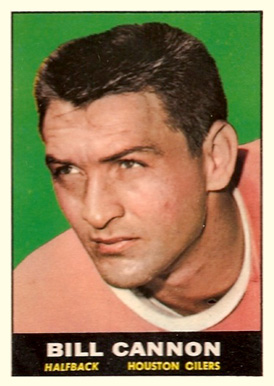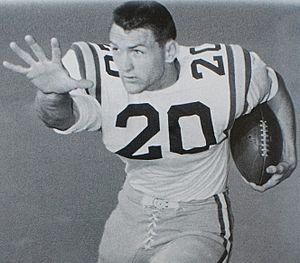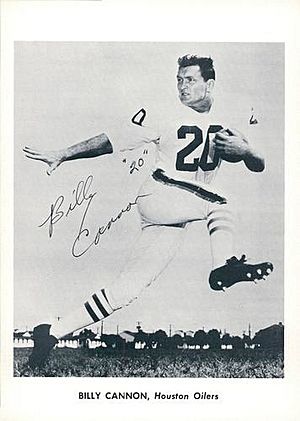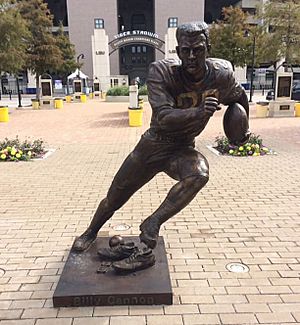Billy Cannon facts for kids

Cannon on a 1961 trading card
|
|||||||||||||||
| No. 20, 33, 80 | |||||||||||||||
|---|---|---|---|---|---|---|---|---|---|---|---|---|---|---|---|
| Position: | Halfback, Fullback, Tight end |
||||||||||||||
| Personal information | |||||||||||||||
| Born: | August 2, 1937 Philadelphia, Mississippi, U.S. |
||||||||||||||
| Died: | May 20, 2018 (aged 80) St. Francisville, Louisiana, U.S. |
||||||||||||||
| Height: | 6 ft 1 in (1.85 m) | ||||||||||||||
| Weight: | 207 lb (94 kg) | ||||||||||||||
| Career information | |||||||||||||||
| High school: | Istrouma (Baton Rouge, Louisiana) | ||||||||||||||
| College: | LSU (1957–1959) | ||||||||||||||
| NFL Draft: | 1960 / Round: 1 / Pick: 1 (by the Los Angeles Rams) |
||||||||||||||
| AFL draft: | 1960 / Round: 1 / Pick: territorial | ||||||||||||||
| Career history | |||||||||||||||
|
|||||||||||||||
| Career highlights and awards | |||||||||||||||
|
|||||||||||||||
| Career professional statistics | |||||||||||||||
|
|||||||||||||||
|
College Football Hall of Fame
|
|||||||||||||||
Billy Cannon (born August 2, 1937 – died May 20, 2018) was a famous American football player. He played as a halfback, fullback, and tight end in both college and professional leagues. Billy Cannon is best known for his amazing college career at Louisiana State University (LSU). There, he won the Heisman Trophy in 1959, which is given to the best college football player in the nation. He also helped his team win a national championship in 1958.
One of his most famous plays was a long punt return against Ole Miss in 1959. Fans still talk about it today! After college, Cannon played professionally for the Houston Oilers, Oakland Raiders, and Kansas City Chiefs. He won three championships in the American Football League (AFL). After football, he became a dentist. Even though he faced some challenges in his life, he is still seen as a legend in Louisiana sports.
Contents
Early Life and High School Years
Billy Cannon was born in Philadelphia, Mississippi. His family later moved to Baton Rouge, Louisiana. There, his father worked during World War II. Billy went to Istrouma High School in Baton Rouge. He was an incredible athlete, standing out in football, basketball, and track.
In his senior year of high school (1955), Billy was a football star. He scored 39 touchdowns and helped his team win a state championship. He set a state record by scoring 229 points that season. In track and field, he also set state records for running the 100-yard dash and throwing the shot put. Billy had some legal troubles early in his life, but his athletic talent was undeniable.
College Football Career at LSU
Even with his past issues, many college teams wanted Billy to play football for them. He chose LSU because they offered him a job between semesters. His mother also wanted him to stay close to home. Billy said he followed his mother's wise advice.
Starting Strong in 1957
Billy joined the LSU varsity football team in 1957 as a sophomore. He played as a halfback and also helped out as a defensive back and punter. He quickly became a key player. In one game against Texas Tech, he showed how versatile he was. He punted well, completed passes, caught a long pass for a touchdown, and returned a kickoff for another touchdown.
LSU finished the 1957 season with a 5–5 record. This was much better than expected. Billy was recognized as one of the best sophomores in the conference. He also led the country in kickoff return average that year.
National Champions in 1958
In 1958, LSU coach Paul Dietzel used a special "three-platoon system." This system helped keep players fresh during games. Billy Cannon led the "White Team," which was the main group of talented players. They played well on both offense and defense.
LSU started the season by winning their first five games easily. They became the number one ranked team in the country. They finished the regular season undefeated and were named national champions. LSU then won the 1959 Sugar Bowl against Clemson. Billy scored all seven points in that game with a touchdown pass and an extra point kick.
After the season, Billy was named an All-American by many sportswriters. He also won player of the year awards from several organizations. He finished third in the voting for the Heisman Trophy. Coach Dietzel called Billy "the finest football player I've ever coached."
The Famous 1959 Season and Heisman Win
In 1959, LSU was expected to win another national title. They started the season as the top-ranked team. Billy showed his amazing skills by leading the team in offense, returning an interception for a touchdown, and averaging 40 yards per punt.
The Halloween Run
On Halloween night in 1959, LSU played against their undefeated rival, Ole Miss. The game was very close and low-scoring. Late in the fourth quarter, with LSU trailing 3–0, Billy made history. He returned a punt 89 yards for a touchdown. He broke seven tackles and ran the last 60 yards untouched! This play is known as "Billy Cannon's Halloween Run." LSU won the game 7–3.
Winning the Heisman Trophy
After the season, Billy Cannon won the Heisman Trophy. He was chosen as the nation's most outstanding player. Even though he only scored six touchdowns that season, his amazing defensive plays and the famous Halloween run convinced voters. Vice President Richard Nixon presented him with the award. Billy was the second player from the SEC conference to win the Heisman. LSU later retired his number 20 jersey to honor him.
Professional Football Career
Joining the Pros: A Contract Dispute
In 1959, Billy signed a contract with the Los Angeles Rams of the National Football League (NFL). But then, he signed another contract with the Houston Oilers of the new American Football League (AFL). This caused a big legal fight. A judge decided that both contracts were not valid. The judge said Billy was "exceptionally naive" about business. After this, Billy officially signed with the Oilers. His contract made him the first professional football player to earn over $100,000.
Houston Oilers Success
Billy joined the new Houston Oilers team. In his first year, he led the team in rushing yards. He also caught a long touchdown pass in the 1960 AFL Championship Game. This helped the Oilers win the first-ever AFL championship. Billy was named the game's Most Valuable Player (MVP).
In 1961, Billy had an incredible game against the New York Titans. He set a professional football record with 373 total yards and scored five touchdowns. He also set an AFL record with 216 rushing yards in that game. He led the AFL in rushing yards and total yards that season. The Oilers won the AFL championship again in 1961, and Billy was once more the MVP of the game.
Billy faced some injuries in 1962 and 1963. He decided it was time to leave the Oilers. He said he left with good feelings and many friends.
Oakland Raiders and a New Role
Billy was traded to the Oakland Raiders in 1964. The Raiders' coach, Al Davis, moved Billy to fullback. Billy was good at catching passes, which was unusual for fullbacks then. He had a strong season with many catches and touchdowns.
The next season, Davis moved him again, this time to tight end. Billy wasn't happy at first, but he quickly learned the new position. In 1967, Billy had his best season as a tight end. He led all AFL tight ends in receiving yards and touchdowns. He helped the Raiders win the 1967 AFL Championship. This win sent them to the second AFL–NFL World Championship game, now known as Super Bowl II. The Raiders lost to the Green Bay Packers.
Billy played two more seasons with the Raiders. He was invited to his second All-Star game in 1969. He left the Raiders in 1970.
Kansas City Chiefs and Retirement
Billy was planning to study orthodontics when the Kansas City Chiefs coach, Hank Stram, called him. Billy played six games for the Chiefs in 1970. He caught two touchdowns before an injury ended his season. He decided to retire from football after 11 years.
Billy finished his professional career with over 2,400 rushing yards and over 3,600 receiving yards. He scored 64 touchdowns in total. He holds an NFL record for the most yards from scrimmage in a non-overtime game (330 yards in 1961).
Life After Football
Billy Cannon married his high school sweetheart, Dot Dupuy, and they had five children. His son, Billy Cannon Jr., also played football and was drafted by the Dallas Cowboys.
Billy went to dental school while playing football during the off-season. He earned his dental degree and later studied orthodontics. After retiring from football, he opened his own dental practice in Baton Rouge.
In 1983, Billy faced financial problems due to bad investments. He became involved in a scheme that led to him serving two and a half years in prison. After his release in 1986, he got his dentistry license back. In 1995, he started working as a dentist at the Louisiana State Penitentiary, a prison. He did a great job organizing the dental program there. He even became in charge of the prison's entire medical system. Inmates at the prison often called him "Legend."
Billy Cannon lived in St. Francisville, Louisiana, with his wife. He passed away peacefully in his sleep on May 20, 2018, at the age of 80.
Legacy and Honors
Billy Cannon is still a highly respected figure in Louisiana sports. Even with his past challenges, fans remember him as an icon. During an LSU homecoming game in 2003, fans gave him a long standing ovation. A video of his famous Halloween run is still played on the big screen at LSU's Tiger Stadium before every home game. In a poll, fans voted him LSU's best player since 1940.
Billy Cannon was LSU's only Heisman winner until Joe Burrow won in 2019. LSU retired his number 20 jersey in 1960. He was inducted into the LSU Athletic Hall of Fame in 1975 and the Louisiana Sports Hall of Fame in 1976. He was first chosen for the College Football Hall of Fame in 1983, but his induction was delayed due to his legal issues. However, he was finally inducted into the College Football Hall of Fame in 2008. In 2018, a statue honoring Billy Cannon was placed near Tiger Stadium.
See also
- List of unanimous All-Americans in college football
- List of first overall National Football League draft picks
 | Mary Eliza Mahoney |
 | Susie King Taylor |
 | Ida Gray |
 | Eliza Ann Grier |




